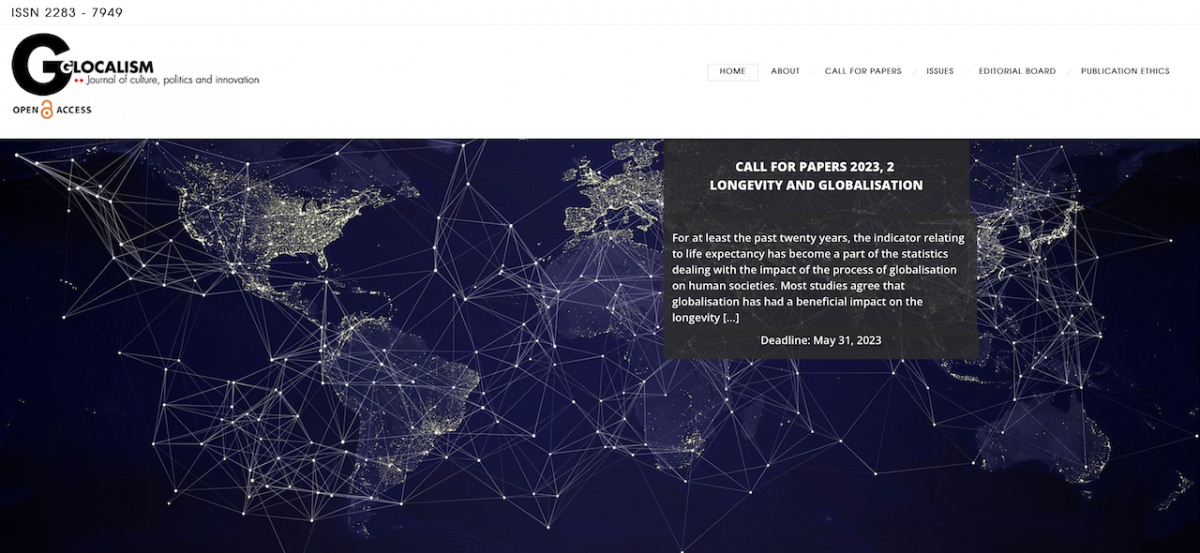Glocalism: Journal of Culture, Politics and Innovation
LONGEVITY AND GLOBALISATION/2023/2
ISSN: 2283-7949
Deadline: Wed, 31 May 2023
Contact: submission@glocalismjournal.org


Glocalism, a peer-reviewed, open-access and cross-disciplinary journal, is currently accepting manuscripts for publication. We welcome studies in any field, with or without comparative approach, that address both practical effects and theoretical import.
All papers should be sent to: submission@glocalismjournal.org
Articles can be in any language and length chosen by the author (abstract and keywords in English).
Deadline: 31 May 2023. This issue (2023, 2) is scheduled to appear at the end of July 2023.
Website: https://glocalismjournal.org/
Direction Committee: Arjun Appadurai (New York University); Daniele Archibugi Birkbeck, University of London); Seyla Benhabib (Yale University); Sabino Cassese (Scuola Normale Superiore); Manuel Castells (Universitat Oberta de Catalunya); Fred Dallmayr (University of Notre Dame); Anthony Giddens (London School of Economics and Political Science); Sheila Jasanoff (Harvard University); Hans Köchler (University of Innsbruck); Alberto Martinelli (Università degli Studi di Milano); Anthony McGrew (La Trobe University, Melbourne); Alberto Quadrio Curzio (Università Cattolica del Sacro Cuore); Saskia Sassen (Columbia University); Amartya Sen (Harvard University); Gayatri Chakravorty Spivak (Columbia University); Alain Touraine (École des Hautes Études en Sciences Sociales).
The topic of this issue: Longevity and Globalisation
For at least the past twenty years, the indicator relating to life expectancy has become a part of the statistics dealing with the impact of the process of globalisation on human societies. Most studies agree that globalisation has had a beneficial impact on the longevity of the world’s population. According to these studies, the various dimensions of globalisation (economic, political, social, cultural) enable the spread of knowledge, skills, and technology, positively influencing the quantity and quality of life of the world’s population, despite persistent inequalities.
In fact, the UN’s demographic estimates (“2022 Revision of World Population Prospects”) forecast a constant increase in the world’s population until 2100. This tendency is principally due to the decline in mortality rate and the increase in life expectancy. In other words, longevity represents the fundamental element of this growth, and this, in turn, appears to be sustained and positively reinforced by the forward march of globalisation. On the other hand, however, this increase in longevity indicates the general ageing of the world’s population. The UN claims that if today, the over-65 segment of the population represents around 10 percent of humanity, by 2050, this same segment will represent 16 percent of the total population. Will this have an impact on the dynamics of globalisation? How?
The pandemic context we find ourselves living in since 2020 may give us one of the first answers to this question. After decades of uninterrupted growth, the Human Development Index (HDI) instituted by the UN in 1990, indicated a significant decline. Average life expectancy decreased by two years, but if we look at a breakdown of the data, we notice an inequality between countries where longevity has dropped by up to three years (in some countries of Latin America, Asia and Africa, for example) and countries where it has risen by one year (for example Australia and New Zealand). In the first case, the deficits of health systems and difficulty accessing treatment caused an increase in deaths, while in the second case, the use of masks and social distancing limited the spread of other infections (such as viral pneumonia) and travel restrictions lessened other causes of death (for example, traffic accidents). Even in this context, therefore, local differences in the process of globalisation emerge.
How has the existing relationship between longevity and globalisation developed over the past few decades? From the perspective of world population demographics, how has the relationship changed and how will it change in the future? Which global policies have supported the increase in longevity and how have these been reconfigured on the local scale with the goal of attaining the general objectives they intend to pursue? In view of the ageing world population, which actions should be taken by political actors and how will ageing impact the process of globalisation?











